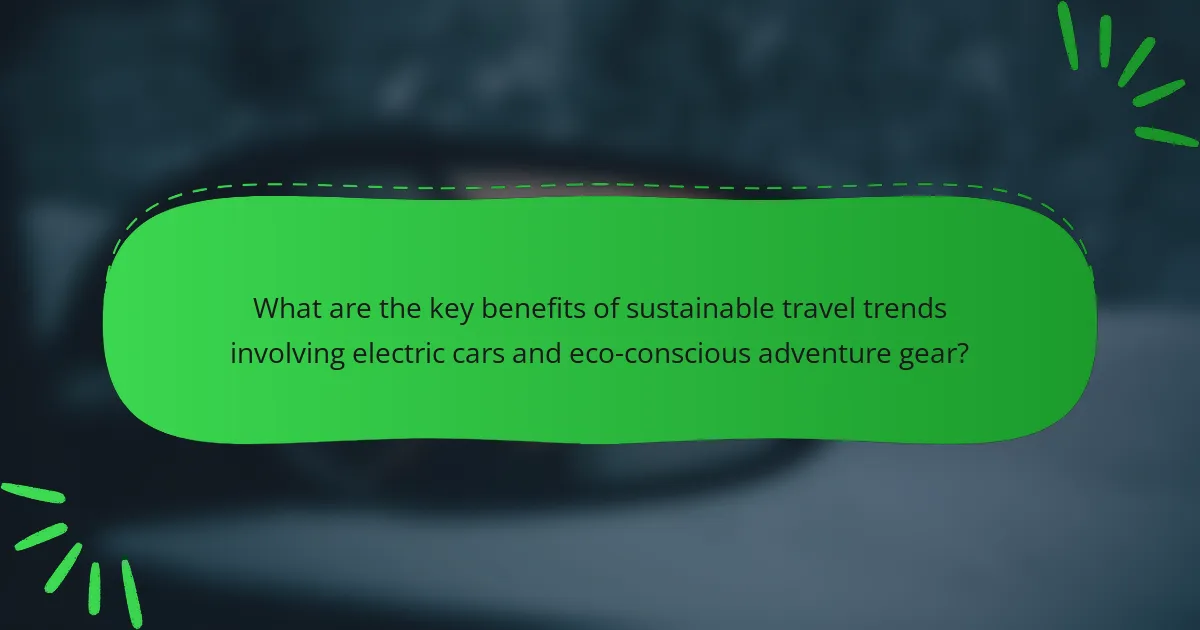Sustainable travel trends significantly reduce carbon emissions and promote environmental stewardship. Electric cars offer cleaner transportation options with advanced technology and lower fuel costs. Eco-conscious adventure gear, such as biodegradable tents and solar-powered chargers, minimises waste while enhancing outdoor experiences. Together, these innovations foster a responsible travel culture that prioritises conservation and ethical practices.

What are the key benefits of sustainable travel trends involving electric cars and eco-conscious adventure gear?
Sustainable travel trends involving electric cars and eco-conscious adventure gear offer significant benefits. These practices reduce carbon emissions, promote conservation, and enhance travel experiences.
Electric cars contribute to cleaner air by minimising greenhouse gas emissions. They often feature advanced technology, improving energy efficiency. Additionally, using electric vehicles can lead to lower fuel costs over time.
Eco-conscious adventure gear, such as biodegradable tents and reusable water bottles, reduces waste and environmental impact. This gear often utilises sustainable materials, supporting ethical manufacturing practices.
Together, these trends foster a more responsible travel culture, encouraging travellers to prioritise environmental stewardship while enjoying their adventures.
How does using electric cars contribute to reducing carbon footprints?
Using electric cars significantly reduces carbon footprints by minimising greenhouse gas emissions. Electric vehicles produce zero tailpipe emissions, which directly lowers air pollution. Additionally, when charged with renewable energy sources, their overall carbon impact decreases further. Studies show that electric cars can reduce carbon emissions by up to 70% compared to traditional petrol vehicles. This transition supports sustainable travel by promoting eco-conscious choices and reducing reliance on fossil fuels.
What are the environmental advantages of eco-conscious adventure gear?
Eco-conscious adventure gear significantly reduces environmental impact by utilising sustainable materials and promoting responsible consumption. These products often feature recycled fabrics, biodegradable components, and energy-efficient manufacturing processes. As a result, they help decrease waste and carbon emissions. Additionally, many brands prioritise ethical sourcing, ensuring fair labour practices and minimal ecological disruption. This holistic approach fosters a healthier planet for future generations.

Which electric car models are leading the sustainable travel market in 2025?
In 2025, leading electric car models in the sustainable travel market include the Tesla Model 3, Ford Mustang Mach-E, and Volkswagen ID.4. These models excel in eco-friendliness, range, and technology.
The Tesla Model 3 offers a range of up to 358 miles and features advanced autopilot capabilities. The Ford Mustang Mach-E combines style with a range of 300 miles and fast charging options. The Volkswagen ID.4 stands out with its spacious interior and a range of approximately 250 miles.
These electric vehicles represent a significant shift towards sustainable travel, reducing carbon emissions while providing innovative features that enhance the driving experience.
What unique features do these electric cars offer for travellers?
Electric cars offer unique features that enhance the travel experience for eco-conscious adventurers. These vehicles typically include advanced navigation systems that optimise routes for charging stations, ensuring a seamless journey. Additionally, many electric cars provide regenerative braking, which extends battery life and improves efficiency during travel.
Moreover, some models come equipped with spacious interiors and smart technology that enhance comfort and connectivity. The quiet operation of electric vehicles also allows for a more peaceful travel experience, enabling travellers to enjoy nature without the distraction of engine noise. Lastly, many electric cars incorporate sustainable materials in their design, aligning with the values of eco-conscious travellers.
How do charging infrastructures vary across regions for electric vehicles?
Charging infrastructures for electric vehicles vary significantly across regions due to factors like government policies, urban development, and population density. In regions with strong government support, such as parts of Europe, extensive charging networks exist, facilitating widespread electric vehicle adoption. In contrast, rural areas often lack sufficient infrastructure, limiting access to charging stations. Urban centres typically have more charging options, including fast chargers, while suburban areas may rely on home charging solutions. Additionally, some regions invest in renewable energy sources to power charging stations, enhancing sustainability.

What types of eco-conscious adventure gear are popular among travellers today?
Eco-conscious adventure gear popular among travellers today includes items like biodegradable tents, solar-powered chargers, and recycled material backpacks. These products emphasise sustainability while enhancing outdoor experiences. Many brands focus on eco-friendly materials, ensuring durability and minimising environmental impact. Travellers increasingly prioritise gear that aligns with their values, reflecting a shift towards responsible tourism.
How do these products enhance the travel experience while being environmentally friendly?
Sustainable travel products enhance the travel experience by reducing carbon footprints and promoting eco-friendly practices. Electric cars provide zero emissions, making them ideal for exploring nature without harming the environment. Eco-conscious adventure gear, made from recycled materials, supports sustainable tourism and minimises waste. These products encourage travellers to engage with their surroundings responsibly, leading to more meaningful and environmentally friendly adventures.
Which brands are recognised for their commitment to sustainability in adventure gear?
Brands recognised for their commitment to sustainability in adventure gear include Patagonia, The North Face, REI, Columbia, and Arc’teryx. These companies prioritise eco-friendly materials, ethical manufacturing practices, and initiatives to reduce environmental impact. For instance, Patagonia’s use of recycled materials and The North Face’s commitment to circular economy principles highlight their leadership in sustainable practices. Additionally, REI’s co-op model supports outdoor conservation efforts, further emphasising their dedication to sustainability.

How can travellers ensure they are making eco-friendly choices during their trips?
Travellers can ensure eco-friendly choices by opting for electric cars and sustainable adventure gear. Electric vehicles reduce carbon emissions, making them a cleaner transport option. Additionally, eco-conscious gear, such as biodegradable tents and solar-powered gadgets, minimises environmental impact. Choosing local, sustainable accommodations further supports eco-friendly tourism. Prioritising these options fosters a responsible travel experience and promotes conservation.
What practices should be adopted for sustainable travel in urban areas?
Adopting sustainable travel practices in urban areas involves using electric cars and eco-conscious gear. Prioritise electric vehicles to reduce emissions and choose adventure gear made from sustainable materials. Opt for public transportation and biking to minimise your carbon footprint. Support local businesses that promote sustainability to enhance community impact.
Which destinations are prioritising sustainable tourism initiatives?
Several destinations are prioritising sustainable tourism initiatives, focusing on eco-friendly practices. Countries like Sweden, Costa Rica, and New Zealand are leading the way.
Sweden promotes electric vehicles and renewable energy in tourism. Costa Rica emphasises biodiversity and conservation, attracting eco-conscious travellers. New Zealand integrates sustainable practices in its adventure tourism sector.
These destinations exemplify a commitment to sustainable travel trends, enhancing both environmental protection and visitor experiences.

What challenges do travellers face when adopting sustainable travel practices?
Travellers face several challenges when adopting sustainable travel practices. Key issues include the limited availability of electric vehicle charging stations, higher costs of eco-friendly gear, and a lack of awareness about sustainable options. Additionally, many travellers struggle to find accommodations that prioritise environmental responsibility. These barriers can deter individuals from fully committing to sustainable travel trends like electric cars and eco-conscious adventure gear.
How can these challenges be overcome with proper planning?
Proper planning can mitigate challenges in sustainable travel by prioritising eco-friendly transportation and gear. Utilizing electric cars reduces carbon emissions, while selecting eco-conscious adventure gear minimises environmental impact. Researching local regulations and sustainable practices enhances travel experiences. Engaging with local communities fosters responsible tourism, ensuring that benefits reach those directly affected.
What role does consumer awareness play in promoting sustainable travel?
Consumer awareness significantly enhances sustainable travel by encouraging eco-friendly choices. Informed travellers are more likely to select electric cars and eco-conscious adventure gear, reducing their carbon footprint. Research shows that 70% of consumers prioritise sustainability when choosing travel options. This trend fosters demand for greener products, prompting brands to innovate and adopt sustainable practices. As a result, consumer awareness not only drives market change but also promotes a culture of sustainability in travel.

What are the trends shaping the future of sustainable travel beyond 2025?
Sustainable travel trends beyond 2025 will focus on electric cars and eco-conscious adventure gear. Electric vehicles will dominate transportation, reducing carbon footprints significantly. Eco-friendly gear will prioritise sustainable materials, enhancing outdoor experiences while minimising environmental impact. Innovative technologies in both sectors will drive efficiency and user engagement. The rise of shared mobility solutions will further promote sustainable travel practices, reducing reliance on personal vehicles.
How is technology influencing sustainable travel innovations?
Technology is driving sustainable travel innovations through electric vehicles and eco-friendly gear. Electric cars reduce carbon emissions, providing an efficient alternative to traditional vehicles. Eco-conscious adventure gear, made from sustainable materials, enhances outdoor experiences while minimising environmental impact. For instance, brands are increasingly using recycled fabrics and biodegradable products. As a result, travellers can engage in eco-friendly practices while exploring nature. This shift towards sustainability aligns with the growing consumer demand for responsible travel options.
What emerging eco-friendly materials are being used in adventure gear?
Emerging eco-friendly materials in adventure gear include recycled plastics, organic cotton, hemp, and biodegradable composites. These materials reduce environmental impact while enhancing performance. For instance, recycled polyester is gaining popularity for its durability and lower carbon footprint. Organic cotton provides comfort without harmful chemicals, while hemp is known for its strength and sustainability. Biodegradable composites offer innovative solutions for reducing waste in gear manufacturing.
What expert tips can enhance sustainable travel practices for individuals?
To enhance sustainable travel practices, individuals should adopt electric vehicles and eco-conscious gear. These choices significantly reduce carbon footprints.
Using electric cars minimises greenhouse gas emissions compared to traditional vehicles. Eco-friendly adventure gear, such as biodegradable tents and reusable water bottles, promotes environmental responsibility.
Travellers can also support local businesses that prioritise sustainability. Engaging in eco-tourism activities fosters a deeper connection with nature while protecting ecosystems.
Lastly, staying informed about sustainable travel trends helps individuals make better choices. Awareness of the latest innovations, like solar-powered gadgets, can enhance eco-friendly travel experiences.
